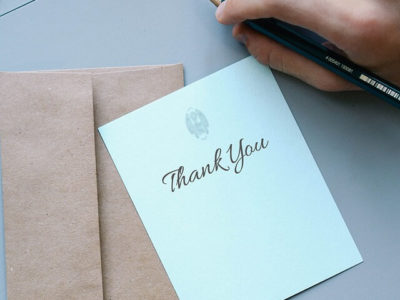Writing notes by hand can seem outdated and unnecessary, especially when it’s faster and easier to send a text message or email. Students are always looking for ways to get a leg up in the professional world. Is crafting a well-written note the game changer we’re looking for? The answer: sort of.
PRO: It Helps You Stand Out
Your post-grad plans in all likelihood involve job interviews, and you want your name to stand out in the crowd of applicants. Boston College Career Center representative Hannah Luke said a handwritten thank you demonstrates an extra degree of thoughtfulness. “It shows that you took extra time, especially because everyone’s default mode of communication these days is email,” said Luke. You should always thank an employer for her time, but a little penmanship can add a personal touch.
CON: It Can’t Improve Your Qualifications
The note won’t improve your credentials or make you more qualified for a position; your resume ultimately carries the day. In an interview, you want to lean on your work and volunteer experience. Something small like a note won’t help you if you’re not qualified for the job. In fact, attempting to compensate for a few shortcomings could make things worse.
PRO: It Establishes a Relationship
A little piece of paper and some ink can go a long way in building professional relationships. BC English professor Thomas Kaplan-Maxfield, said that professors can write better recommendations for students if they know them better. The bottom line is that hand writing a thank you note to a professor is a nice gesture and the right thing to do to show appreciation—just don’t expect this one note to be the glue that creates a lasting relationship.
CON: It Curries Favor
Students may think of handwritten thank you notes simply as a way of trying to get on their professors’ good side. Kaplan-Maxfield said this mindset often has the opposite effect and seems manipulative and self-serving.“Like someone is doing something because it’s expedient. It will produce a particular effect—like getting to know a professor so that he or she will give you a better grade,” he said. Don’t think a note will win you leniency on the essay you wrote at 2 a.m.
PRO: It’s Permanent
A note to an employer that cites some of the things you talked about in the interview will at the very least help him remember your name and the conversation. This also demonstrates how well you listened and paid attention to details—valuable in any work place. (Writing the note immediately following the interview helps too.) Unlike an email, an employer can’t hit the delete button and pretend they never got the message. Take it from the founding fathers, when you put ink to paper, it’s permanent.
CON: It Isn’t the Only Option
Though more memorable, notes aren’t the only way to get to know professors and potential employers. “I would say that any personal contact—office visit, brief chat, even email—is a way of establishing a connection between a student and professor,” said Kaplan-Maxfield. Your trusty ballpoint pen isn’t the end-all relationship builder; numerous ways to communicate are available on your smartphone alone.
At the end of the day, hand writing a thank you note to a professor or an employer can’t hurt, and every little bit helps. As you sit down and pen a note after weighing the pros and cons, just make sure that you’re writing from a place of care. Keep the note short and sweet, and remember that subtle flattery is encouraged.



















